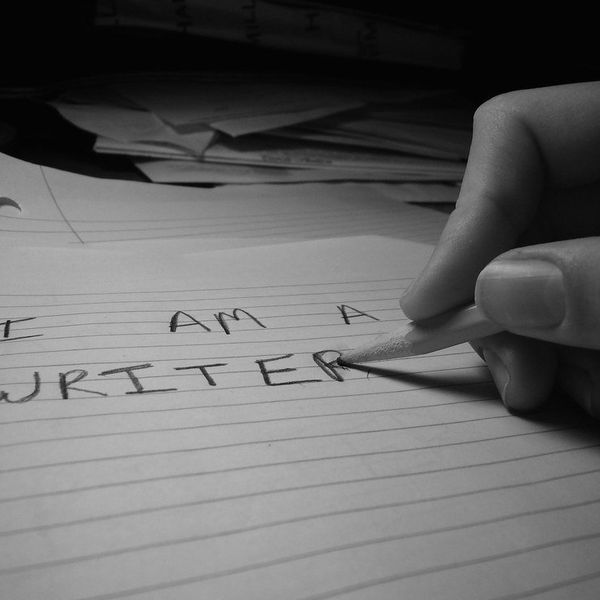Common Problems when writing poetry:
Understanding poetry: There are several kinds of poetry styles, with differing rhyme schemes and repeating of lines. The poetry schemes often look like a combination of letters like ABABBACCD. But be sure to check if the pattern is referring to the repetition of rhymes or lines. Start out with free verse, it has now style or scheme, then try different kinds of styles. I would first like to state that ending lines early in poems opposed to writing essays, are perfectly acceptable unless the sentence does not continue in the next line
1. Finding your inspiration
Finding the inspiration can be hard for anyone, partly because they might not be too adamant on the topic, and might not know how to introduce the topic. Some people get inspiration from another poem or song, some find inspiration from photos or from what people say on social media or in person. Wherever we get inspiration, it's best to just get words on paper before they are forgotten
2. Finding where to start
No matter the topic or the piece of writing, a question always does the trick. Sometimes a statement does great.
1. Why doesn't she like Santa Claus?
Rosey cheeks and beard so white,
the seven-year-old child looks at fake Santa
like "what else does he do Christmas night".
2. I'm going to wrap a gift
With glitter, tape, and a bow on top.
If only I knew what I'd get her,
A ring, a book, or a robotic bunny that hops.
3. Overcoming brain farts
Brainstorm with family and friends, (or even your pet, who knows maybe Garfield will inspire some fresh ideas)
Check Thesaurus, or write down some rhymes of your own
Listen to Music, Read a Book, Watch a Movie for additional inspiration
Get a drink or a snack -water might help flush out any headaches, and sometimes helps refresh the mind; plus people always known that snacks are needed for "brain food".
Take a nap- keep a notepad nearby and hope for the best.
Exercise (running helps circulate blood through the body, including the brain)
Marijuana? ( **NOTE: Weed is not legal in all states yet, beware** it's not for everyone, but to some weed helps people with thinking...)
Combine some of these remedies for additional help brainstorming
Whether the poem is goofy or serious, to be honest, all that matters is that if it rhymes, if it's inspiring, or both.
4. Figuring out where to stop
If writing a certain type of poem with the rhyme scheme and specific number of lines, you have your stopping point. Yet if writing a free verse poem there is no benchmark to stop at, in which case, stop when the topic is exhausted. I recommend stopping at the last length where you yourself would read a poem -typically 10-15 lines.
5. Being as descriptive as possible.
Don't be afraid to be too descriptive, it might provide more ideas and there is always time to change it and reorganize it. It's always better to have a clear image of what the writer wants to portray, it's even more poetic.
6. Finding a way to bring the pieces together
Find things that are similar to the topic being written about and maybe then there will be an opportunity to sufficiently fill the gap with a terrific metaphor or simile.
7. Following the form and rhyme scheme
There are dozens of poetic styles and schemes out there. If you start with one rhyme scheme then fall short, switch to something shorter, easier, or find synonyms for words or other descriptors. Maybe cut a certain event and replace it with another, less complicated or more so.
8. Being able to finish the poem
Be sure to write about something that you can write a lot about. Try to find words that inspire more ideas related with your topic. Try incorporating words with many rhymes for maximum results.
9. Finding the right words
Think about personal experiences either of the topic being written about or similar to whats being written about. Use personal experiences to incorporate sincere emotions about the event, object, or person.
Of course, there are different kinds of words in the dictionary to describe or call certain things, events, people. In a rhyme scheme, only certain synonyms of a word may work in the poem. Therefore its maybe helpful to keep a thesaurus, dictionary, or "Thesaurus.com" nearby to help fit certain rhymes and synonyms to best help the poem.
Additionally, although it maybe weird, if read in your head, try ending sentences early if that makes it easier to rhyme.
10. Incorporating a message
No poem is going to be finished without a message in mind.
What exactly is the point of the poem? Is it to describe a certain experience like a walk in the park or a football game? Or is it to speak out against something, to praise something [or someone]?
What specific events, thoughts, or objects do you usually associate with the event or most people consider to be involved in the topic being written about? Now pick and choose the events, thoughts, or objects that support your opinion or topic being written about.





















